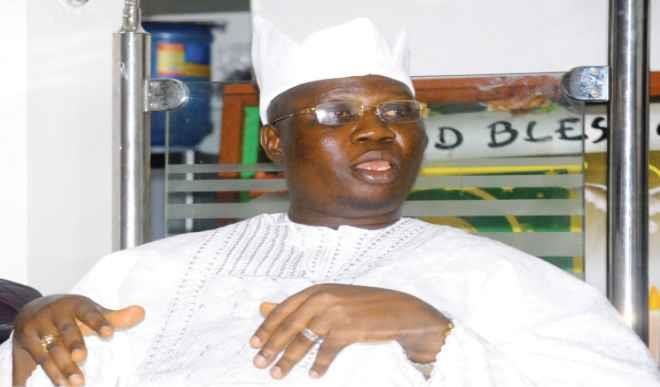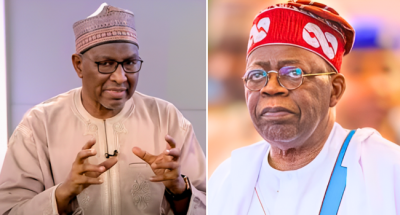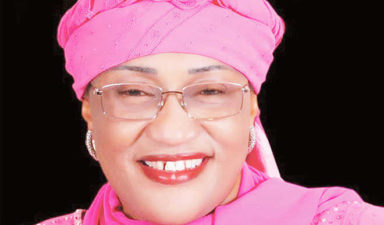Coordinator of the Oodua Peoples Congress, Gani Adams, who is being installed today in Oyo as the new Aare Ona Kakanfo of Yorubaland, speaks with Daily Trust Saturday on the journey to his emergence as the new Yoruba war leader. He also talks on how he hopes to use the position to advance Yoruba interests, and his opinion on traditional rulers who describe themselves as born-again adherents of other religions, among other issues. (Daily Trust)
From an unknown quantity in the Oodua People’s Congress at its foundation to being the Aare Ona Kakanfo today. What exactly was your vision when you set out as a foot soldier in the OPC?
I never envisaged rising up to this prestigious point. I started out in the OPC merely as a lover of my Yoruba race, and of my country. I have always been a fighter for justice; I love to defend the interest of the oppressed. It was that disposition that took me into the struggle following the annulment of the June 12, 1983 presidential election that Chief M.K.O. Abiola clearly won.
I first joined the struggle in July 1983 through the Campaign for Democracy (CD). It was from that group that I learnt the basics and was able to build my ideology.
The Yoruba believe in divination, consulting seers to know what the future holds for their children. Was there anything foretold about your tempestuous journey through life?
There was no information other than one my mother told me, that when I was born, I was still covered in blood when I was taken to a herbalist in Ekiti. She said after the herbalist had cleaned up the blood, he told her I would be a great child. She told me this in 1989, before she passed on in 1993.
The second indication I can remember was that there used to be a prophet in our community who was known as Otitokoro. In 1975 when I was five years old, Otitokoro came to our house and said there was a child there who would become a big star. He advised that I must be moved out of the house within three days, otherwise something bad would happen there. And that was how I was taken out of my ancestral village, Arigidi, in Ondo State, to neighbouring Erusu Akoko, my mother’s hometown.
When you were coming up the OPC ladder, there were those who saw you as an irritant leading a pack of misdirected youths. How did you get where you are today?
The background of every good struggle is always rough. If you are genuinely fighting for the interest of the people, the oppressors will not like you. They will provoke you. But then it is when you are provoked that you will be able to know those who are your true friends. You will also learn your lessons. That has always been the case all over the world. And that was my case.
I am a product of a long struggle, which shaped what I am today. Many police officers hated and maltreated me. Even journalists hated me so much they were always writing reports that were not true, and they didn’t bother to be properly informed. But many of such people are now my friends. I have forgiven them. If someone doesn’t have a rough beginning, there is no way he will have a present people can write well about.
How did your march to the Aare Ona Kakanfo title begin?
In May 2017, I met the Alaafin of Oyo and signified my intention to occupy the position. His Imperial Majesty was laughing at me when I said so. But he later said yes, that I did possess, among other qualifications, the spiritual means and the structures, which are the Oodua People’s Congress (OPC), Olokun Festival, Oodua Progressive Union (OPU), to be the Aare.
The Alaafin told me to wait while he takes his time to consult very important figures in Yorubaland, including state governors and top traditional rulers. He told me that though he is the Alaafin and possesses the prerogative to give me the title, he would still need to consult other important personalities, as the Aare Ona Kakanfo title is for the entire Yoruba tribe.
It took the Alaafin five months to get back to me. He said he had consulted with who is who in Yorubaland and it had been agreed he should confer the title on me. He gave me the proclamation letter on October 15, 2017.
What spurred you to make the move?
From the fight against injustice, I progressed into promoting Yoruba culture and tradition. And I was, and am aware of how the Aare Ona Kakanfo means a lot to the Yoruba race both in fighting for Yoruba interest and promoting our culture. The office is a platform to work for the unity of the Yoruba. It is a platform to defend the Yoruba race.
It is a platform for statesmen. Nobody becomes the Aare Ona Kakanfo without being first a statesman among the Yoruba. It is a position that goes beyond sectionalism, a position that makes you defend the interest of the black people all over the world. It is a position that has been in existence for about 558 years when they installed Kokoro Igangan of Iwoye as the Aare. It is older than many communities in Yorubaland. It is a foremost chieftaincy title in Yorubaland. Of course, I’m not saying everybody in Yorubaland recognizes the title, but it remains the only position that is accepted as their own across all the towns and villages across Yorubaland.
Kabiyesi Alaafin has the prerogative to give it to anyone he believes deserves it. And he did consult with all who mattered. As he was calling and reaching out to them, I was being informed. Those who wanted to express reservations, he convinced them. He told them that this man had done a lot for the Yoruba tribe. For those who seemed not to be convinced about the issue of my struggles, he told them I had done a lot for the promotion of our cultures and festivals. He told them I have been doing this for many years without a sponsor. He even gave the instance of the Oodua Peoples Union being in 79 countries across the world.
Would you say you’re redefining the position?
We can’t be warriors in a time of peace. Even in cases where the OPC had defended Yoruba interest, did we act against any tribe without provocation? We have been living peacefully with all other ethnic nationalities. About 40 percent of the businesses in Yorubaland are owned by non-Yoruba. We have never provoked or victimized them, except when our people were attacked.
In the North, has anyone heard about the Yoruba attacking Northerners? In the East, have the Yoruba ever attacked the Igbo? And in Niger-Delta, have the Yoruba ever attacked the people of the area? In fact, I have more friends from other tribes than among the Yoruba. I am not a tribalist; I only hate injustice. I will not say because I have now become the Aare Ona Kakanfo, I will be leading the Yoruba to attack people of other ethnic nationalities. That would be wrong
A good leader should be a peace builder. If I start to fight everybody, do I know from which of the tribes my children will marry? Of course, I will first be a good Yoruba before being a good Nigerian but not on the basis of injustice to other tribes. And it will interest you to know that after I got the letter of proclamation as Aare, I have received many dignitaries from other tribes.
Also, I have received courtesy visits from many Igbo Igwes here in Lagos. A few days ago, 71 different groups from different parts of the Niger/Delta came here. They comprised different professionals, both active and retired. So, why would I be acrimonious to any tribe simply because I have become the Yoruba Aare? In my house here, there are non-Yoruba working with me. In my business, there are also non-Yoruba whom I employed.
Yoruba people are very accommodating. That has always been our history because we allow others to thrive.
There are many Yoruba people in the Diaspora, from Benin Republic to Cuba, Brazil and the USA, flaunting Yoruba culture. As Aare, do you have plans to bring all of them together?
Yes, I will work very hard for the unity of the Yoruba tribe. Other programmes I intend to implement, I will unfold at the installation ceremony. The Yoruba as a people have everything God has endowed us with but we have not been able to pursue them on a united front. We are about 60 million in Nigeria alone, and about 200 million in other parts of the world.
About 45 percent of the population in Benin Republic is Yoruba. Fifteen percent of the population in Togo is Yoruba. Even in Ghana, we have historical linkages with the people of Kumasi. Our mode of dressing is very similar. In Cote D’Ivoire, we have about seven to eight million Yoruba. These are people who have since left here and can hardly speak Yoruba anymore. They speak only French and the local language of where they are domiciled. We have Yoruba in Mali and the Gambia. And a substantial percentage of the Brazilians accept that they have ancestral relationship with the Yoruba race. It is the same in Cuba. It is the same situation in the United States, especially among the blacks whose forefathers were taken there as slaves.
So, we will work with the Yoruba people wherever we find them. We will ensure that we communicate with them, build synergy and make them understand that they are our brothers and sisters. Some of them who have achieved or invented one thing or the other that can be useful for Nigeria, we will encourage them to bring them here. We can also encourage them to come and spend their holidays in Nigeria.
But most significantly, I will continue with the promotion of cultures and values of the Yoruba. The greatest challenge among our people today is our dwindling values and culture. Thus, as the Aare, I will go on with my cultural evangelism. Many don’t know the difference between religion, culture and tradition. There is no way you will relegate your culture and your identity will not go into extinction. Your name, your clothes, your mode of dressing, your manner of greeting, among others will go into oblivion if you don’t promote your culture. Respect for your culture will not make you a lesser Muslim or Christian.
We will also try to enlighten our Obas. They need not be dabbling into issues of Western religion. As a traditional leader, you can’t go into seclusion to perform some rites and later come out to say you have become a born-again. That is a betrayal of the trust reposed in you as a traditionalist. Either as a traditional ruler or a chieftaincy title holder, you must work for people of all religions and faiths. If you come out to denounce your culture, you will be causing moral, spiritual and economic problems for your people.
We must also find a way to preserve our mother tongue. We can’t lose our language because of Western civilisation or religions. This has to be preserved if we don’t want to become completely inferior and lost. Oftentimes, many of my friends do buy and bring for me foreign suits. But I have my own traditional attires that I wear, aimed at projecting my culture. I want to work and ensure that people from other lands will be coming to Yorubaland to buy our native clothes. I want to work with other people to turn Yorubaland into a tourist haven.
Why do you always wear white?
One of the missing links in our lives today is carrying out the process of what the Yoruba called ‘Akose Jaye’, that is, having an insight into what a child will become in future, the kind of food he should be eating, the kind of clothes he should wear, the kind of wife he should marry, among others. But because of civilization many people have dumped this.
So, I can say wearing of white clothes is part of my destiny. It is not as if it is spiritual. When I was told in 1999, I didn’t follow it and I was paying dearly for it. It was in 2004 that I emptied my wardrobe, gave out my clothes and refilled the wardrobe with white clothes. Even my underwear must be white. That is what my guardian angels want. And since then, I have been witnessing peace and tranquillity in all that I do. An adage says that obedience is better than sacrifice.
*This interview was conducted by Daily Trust and published by it on Saturday January 13, 2018.




